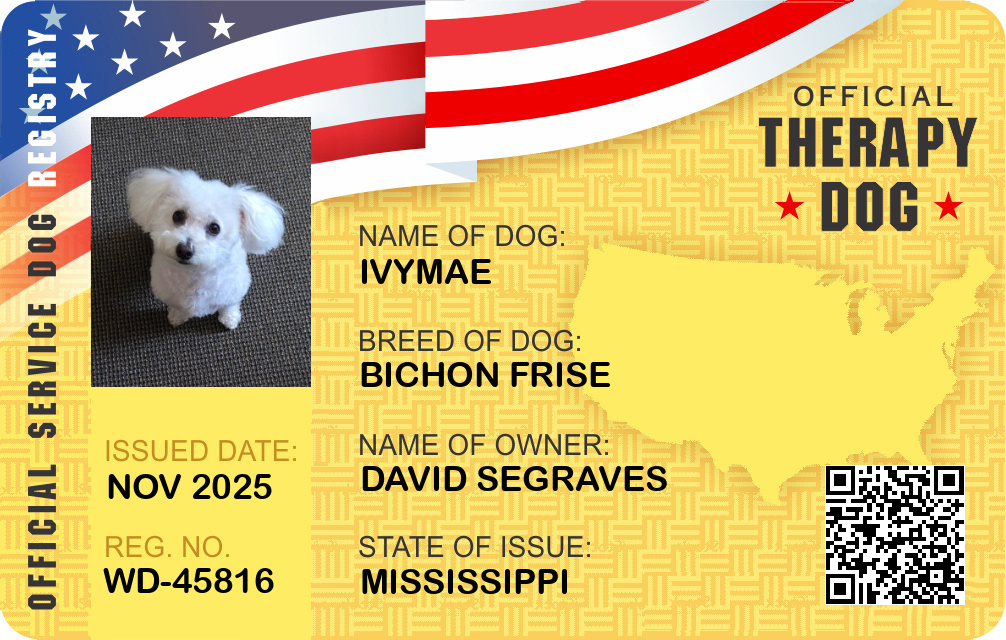Indiana Emotional Support Animal Laws

Overview of ESAs and Legal Definitions in Indiana
What is an Emotional Support Animal?
An Emotional Support Animal (ESA) is an animal that provides comfort, companionship, and emotional relief for individuals suffering from mental or emotional disabilities. Unlike service animals, ESAs do not need specialized training to perform tasks that aid a person with a disability. The primary function of an ESA is to offer therapeutic benefit, companionship, and emotional support, which can help alleviate symptoms of anxiety, depression, or other psychological conditions.
How ESAs Differ from Service Animals
In contrast to ESAs, service animals are specifically trained to perform tasks for individuals with disabilities. This includes guiding individuals with visual impairments, alerting individuals who are deaf, pulling a wheelchair, or fetching items for individuals with mobility impairments. Under the Americans with Disabilities Act (ADA), service animals are typically restricted to dogs (and occasionally miniature horses), while ESAs can be any species. Importantly, because ESAs are not trained to perform specific tasks relating to a disability, they are not granted the same access rights to public places as service animals.
Key Federal Laws Affecting ESAs (e.g., FHA, ACAA)
Two primary federal laws impact ESAs:
- Fair Housing Act (FHA): Mandates that individuals with ESAs have a right to reasonable accommodations in housing, even if pets are not generally allowed. Landlords cannot charge a pet fee for ESAs but may require appropriate documentation.
- Air Carrier Access Act (ACAA): This law formerly required airlines to accommodate ESAs, but recent changes by the U.S. Department of Transportation have limited this to service animals only. Now, ESA owners need to adhere to regular airline pet policies.
State-Specific ESA Laws in Indiana
Housing Rights and Responsibilities
In Indiana, under the FHA, residents with ESAs are entitled to reasonable accommodations in housing. This means:
- Landlords must allow ESAs, even if their property has a no-pet policy.
- Landlords cannot charge additional fees or deposits for having an ESA.
However, ESA owners must provide an ESA letter from a licensed healthcare provider to validate the animal’s necessity. They are also responsible for any damages caused by the ESA.
Public Access and Accommodation
Unlike service animals, ESAs do not have the right to access public places such as restaurants, stores, or theaters in Indiana. Businesses can deny entry to ESAs and are not required to accommodate them as the ADA applies primarily to service animals. Therefore, ESA owners should not expect public environments in Indiana to allow their emotional support animals unless specifically permitted.
Transportation and Travel Rules
Under the ACAA, airlines are not required to accommodate ESAs as they would service animals. For other forms of public transportation in Indiana, similar restrictions apply. ESA owners should plan travel accordingly, checking requirements and policies for transporting pets under general pet guidelines, which may involve additional fees and containment in appropriate carriers.
Employment and Workplace Considerations
In the workplace, ESAs are not afforded the same legal protections as service animals under federal guidelines. Indiana employers are not required by law to allow ESAs in the workplace, though some may choose to provide accommodations voluntarily. Employees seeking to bring an ESA to work should engage in open dialogue with employers, backed by detailed ESA documentation outlining the animal's role in supporting the individual's mental health.
Documentation, Requirements, and Processes in Indiana
ESA Letters and Who Can Issue Them
An ESA letter is a key requirement for individuals seeking housing accommodations. Issued by a licensed mental health professional (LMHP), this letter must indicate:
- The person’s need for the ESA based on a diagnosed mental health condition.
- The professional�
Register Your Dog Instantly
�s contact information and licensing details.
In Indiana, it is crucial that this documentation is up-to-date and submitted in a timely manner when requested by housing providers.
Registration, Certifications, and Common Misconceptions
No formal ESA registration or certification is required by law in Indiana, nor does any state agency offer official registration. Websites offering to register or certify an ESA for a fee are often misleading; authenticity relies solely on a legitimate ESA letter from an LMHP, not a paid registration.
Landlord, Business, and Provider Verification Rules
Landlords in Indiana may verify the authenticity of an ESA letter by contacting the LMHP. However, they cannot demand extensive medical records or details beyond what is included within the ESA documentation. Verification must respect the privacy and confidentiality of the ESA owner.
Rights, Limitations, and Legal Risks
Rights ESA Owners Have in Indiana
ESA owners in Indiana have the following rights:
- Right to reasonable accommodation in housing under the FHA.
- Protection from additional pet fees in housing.
These rights ensure ESA owners can live with their animals in most rental accommodations.
Limits on ESA Protections and Common Restrictions
ESA protections do not extend to:
- Public places where pets are not allowed.
- Air travel accommodations without following general pet rules.
- Equal accommodation in workplaces, unless agreed upon by an employer.
In some cases, landlords may deny ESAs if the animal poses a direct threat to health or property.
Penalties for Fraud or Misrepresentation
The misrepresentation of an ESA as a service animal is legally risky. Owners found falsifying documents or misrepresenting their ESA may face:
- Fines or penalties.
- Eviction from their housing if misrepresentation violates lease terms.
Practical Guidance for ESA Owners in Indiana
How to Qualify for an ESA Legitimately
To qualify for an ESA, an individual must:
- Consult with a licensed mental health professional.
- Obtain a valid ESA letter indicating the need for the animal.
Legitimate qualification requires open communication with the mental health provider and transparency regarding the individual’s mental health needs.
How to Talk to Landlords, Airlines, and Employers
Effective communication involves:
- Presenting valid ESA documentation when requested.
- Discussing accommodation needs while understanding the other party’s rules and policies.
ESA owners should approach conversations with clarity and readiness to provide documentation.
Tips for Avoiding Scams and Legal Problems
Avoid DAO registration scams or illegitimate ESA letters by:
- Consulting only licensed mental health professionals for ESA letters.
- Being wary of websites offering quick ESA certifications for fees.
- Understanding local, state, and federal ESA laws to avoid misrepresentation.
Summary of ESA Laws in Indiana
- ESA Definition: An ESA provides emotional support but lacks specific task-training like a service animal.
- Federal Laws: FHA offers housing rights; ACAA limited air travel rights for ESAs.
- Indiana Laws: No state-specific ESA laws beyond FHA compliance.
- Documentation: ESA letters issued by licensed mental health professionals are essential.
- Access Limitations: ESAs have rights in housing but not public businesses or workplaces.
- Fraud Risks: Falsifying ESA status can lead to penalties or housing-related consequences.
This guide provides Indiana residents with a thorough understanding of their rights, responsibilities, and the legal frameworks governing emotional support animals. Adhering to these rules can aid ESA owners in maintaining legal compliance while enjoying the benefits that their emotional support animals provide.











